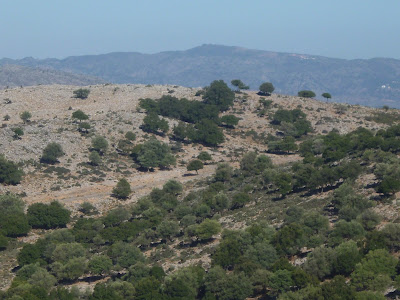On the Friday of our week on Crete we drove to Retimo and continued to Vrises and took the turn off to Sfakia. I was now more comfortable driving and we half knew our way around. You could certainly easily spend longer on Crete than we had and there are many areas we did not go and famous gorges and walks that we did not have the time for.
The road up into the mountains was good sealed bitumen and a comfortable width, not a narrow dangerous track I'd been half expecting.
 |
| No shortage of goats |
It was a hot day, our hottest on Crete, and it gave a feeling for how hard it would have been for the evacuating soldiers marching through these rugged mountains on what was in 1941 a narrow unsealed road not much more than a track in places, at the beginning of June which was summer. Doug Twaits' 2/7th battalion fought some rear guard action at strategic points like tight hairpin bends and narrow passes to delay the pursuing German forces. It had been a command decision to march across Crete and evacuate from the South of the Island as it was further from the German held Piraeus and Athens from where attacking aircraft came. There were evacuations from North Crete with disastrous result and loss of life.
 |
| Typical scenery with olive trees plentiful |
I had read Barry Cassidy's book 'Private Bill' which recounted his father's experiences on Crete and his subsequent capture and internment. Bill Cassidy was wounded and in hospital at the capitulation but his best mate was evacuated on a ship from North Crete which was sunk and he was lost, which could easily have been bill Cassidy's fate. On a trip to Crete as research for his book Barry drove the route of the evacuation march, as we were doing, and he told of a war museum between Kares and Asifkou run by a bloke called George. George's father, also George, was I think about 14 years old when the occupying Germans left in 1945 and he immediately began collecting war memorabilia which was scattered all over the countryside. He ultimately displayed this in a private museum which young George continues after his father died. He is passionate about his collection and receives no government support, and relies on donations from visitors. We easily found the museum following George's own signs from the main road down into his village. When we pulled up he appeared out of nowhere and was a wonderful enthusiastic host who showed us his huge collection of weapons and gear and historical information. We concluded with a slash of oozo and warm hugs and handshakes. It was a memorable highlight of our day and week.
 |
| Museum host George |
Nearing Sfakia the road became a steep winding decline with views out to sea
There was quite a lot of cars at Sfakia as people caught ferries from there to other places but we managed to find a park and had a nice lunch at a restaurant right on the water after viewing the memorial near the little beach.
 |
9000 in total were left behind
|
Doug Twaits was one of those left behind. He didn't escape capture like some, he was not well enough, having drunk water from a polluted well. Those marooned at Sfakia were marched 30 km by the Germans back across the mountains. Doug achieved this with great difficulty and was admitted to hospital in Georgepolus where he spent some months suffering Amoebic Dysentery and was expected to die at one point. This was a British hospital manned by staff who had chosen to stay with their patients rather than be evacuated, but there was a lack of medical supplies as these had been confiscated by the Germans and sent to Germany. Doug was eventually transported to Germany with other patients despite the doctor in charge maintaining they were not well enough.
General Freyberg evacuated but before doing so he oversaw the evacuation from his command cave on the hill above the beach. He was appalled at the lack of discipline and order as troops clamoured to get on the boats taking soldiers to the ships.
 |
| Freyberg's cave above Sfakia |
When I talked to George at the Asifkou war museum, I said to him I had trouble comprehending why these armies would come Crete and proceed to annihilate each other. I was fully aware that Crete was regarded as strategically important, for the Brits to protect their Mediterranean shipping and North African bases, and for Hitler to protect German oil supplies from Rumania, but it still seemed like madness to me, the huge logistic cost, and that of human life. George said, "It's politics, it was all politics." I wonder how Doug felt at the time and after 4 years of incarceration. He said he was happy to join the army when war was declared as he had grown up in a "God, King and Country household". All I can say is, to repeat, madness.
 |
| I think the date is May31- a clipping in George's museum |








No comments:
Post a Comment